8 Must-Have Marketing Automation Tools for 2025
Looking for the best marketing automation tools? Here's a quick guide to 8 tools that can help you streamline campaigns, boost productivity, and drive results in 2025. From AI-powered content creation to advanced lead scoring, these platforms cater to businesses of all sizes.
Key Tools at a Glance:
- Platformly: All-in-one platform with powerful automation features and flexible pricing.
- Klaviyo: Perfect for e-commerce with advanced segmentation.
- ActiveCampaign: Great for email marketing and tailored automation.
- Salesforce Marketing Cloud (Pardot): Ideal for B2B with detailed lead management.
- Brevo (Sendinblue): Budget-friendly with multi-channel features.
- Marketo Engage: Enterprise-grade capabilities for complex campaigns.
- Omnisend: Ecommerce-focused with pre-built workflows.
- Customer.io: Behavioral messaging for SaaS and online businesses.
Quick Comparison
| Tool | Best For | Starting Price | Key Features |
|---|---|---|---|
| Platformly | All-in-one solution | $19/month | Analytics, lead scoring, integrations |
| Klaviyo | E-commerce | $0 (Free Plan) | Advanced segmentation, cart recovery |
| ActiveCampaign | Email automation | $15/month | Custom workflows, integrations |
| Salesforce Pardot | B2B marketing | $1,250/month | Lead grading, CRM integration |
| Brevo (Sendinblue) | Small businesses | $0 (Free Plan) | Email, SMS, CRM tools |
| Marketo Engage | Enterprise campaigns | $1,195/month | ABM, predictive analytics |
| Omnisend | E-commerce automation | $0 (Free Plan) | SMS, push notifications, workflows |
| Customer.io | SaaS businesses | $150/month | Behavioral targeting, APIs |
These tools offer a range of features like AI-driven insights, omnichannel automation, and predictive analytics. Whether you're a startup or an enterprise, there's a solution here to fit your goals and budget.
1. Platformly
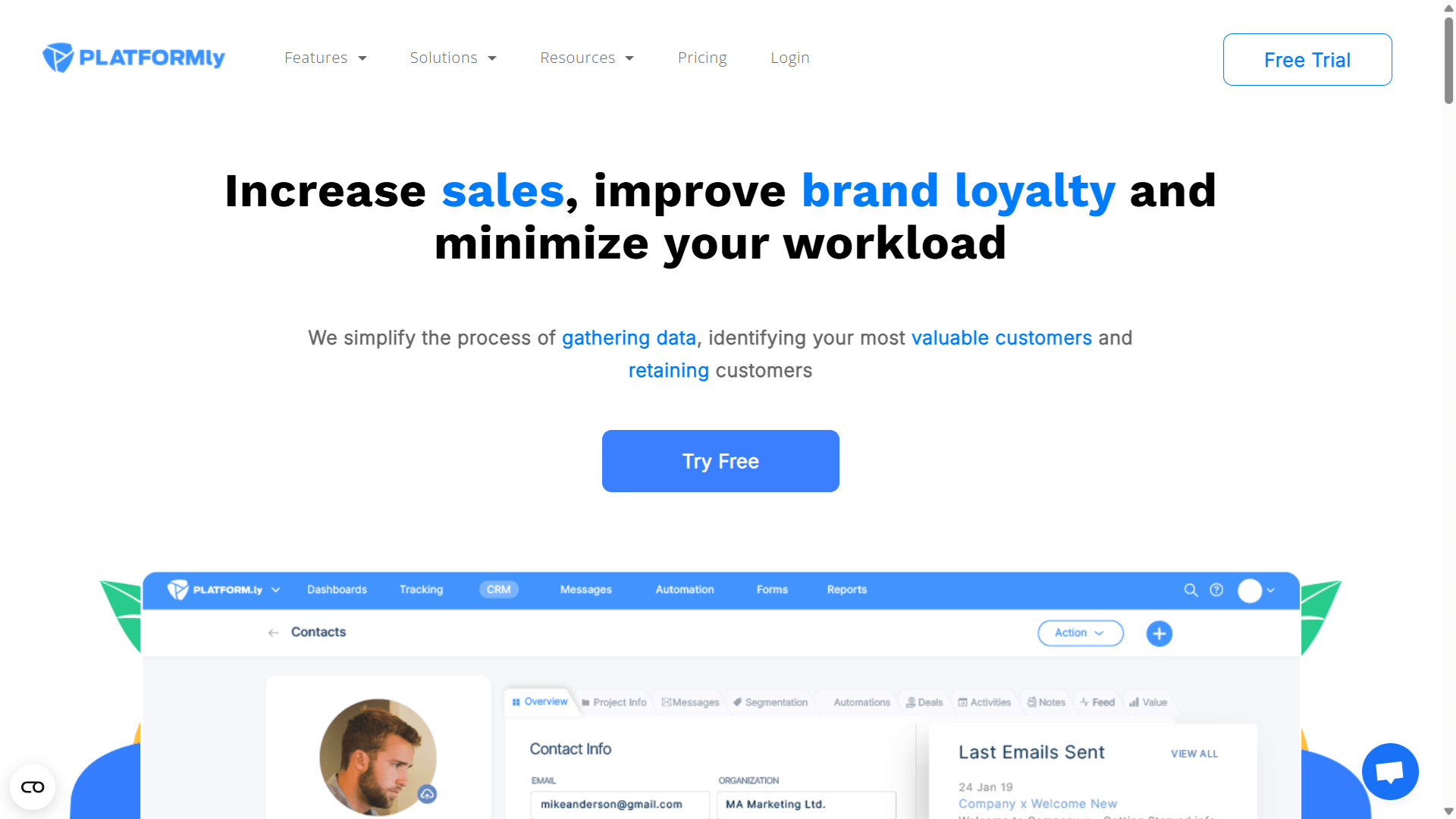
Platformly is a robust marketing automation and business management tool tailored for growth-focused businesses. Known for its user-friendly interface and actionable insights, Platformly enables users to streamline marketing efforts while maintaining full visibility across customer touchpoints.
With continual updates aimed at improving usability and performance, Platformly supports fast implementation and seamless integration across essential business systems. Its focus on automation, real-time analytics, and CRM functionality empowers businesses to make data-driven decisions and achieve tangible results.
A standout feature of Platformly is its real-time business dashboard, which offers a centralized view of key metrics across marketing, sales, and customer engagement. This highly customizable dashboard allows users to track performance in real time, identify trends, and make data-backed decisions quickly. By bringing critical data into one intuitive interface, Platformly helps businesses stay agile and focused on what drives growth.
“Our real-time dashboard is a game-changer for growing businesses,” says Colin Klinkert, Founder of Platformly. “It gives users instant access to the metrics that matter most, so they can pivot quickly, optimize campaigns on the fly, and make smarter decisions — without getting lost in complex reports.”
The platform also includes several other powerful features, including but not limited to:
- Marketing Automation – Powerful automation workflows to engage leads and customers at the right time.
- Email Marketing Tools – Drag-and-drop email builder, segmentation, and A/B testing for optimized campaigns.
- CRM (Customer Relationship Management) – Built-in CRM to track leads, manage pipelines, and maintain customer data.
- Lead Capture Tools – Forms, landing pages, and pop-ups to convert visitors into leads.
- Link Tracking & Attribution – Track every click, source, and campaign to understand what’s driving conversions.
- Integrations – Connects with popular tools like Zapier, Stripe, Twilio, and more.
- Contact Segmentation – Advanced tagging and filtering to personalize marketing efforts.
- Reporting & Analytics – Comprehensive reports to measure campaign performance and ROI.
- Team Collaboration Features – Role-based access and shared dashboards for streamlined teamwork.
Platformly offers flexible pricing plans to suit businesses of all sizes:
| Plan | Monthly Rate | Contacts | Core Features |
|---|---|---|---|
| Starter | From $19 | 1,000 & up | 1,000 emails/month, 1 dashboard, 1 domain, 5 integrations |
| Growth | From $68 | 1,000 & up | 100,000 emails/month, 5 dashboards, 5 domains, unlimited integrations |
| Unlimited | From $118 | 1,000 & up | Unlimited emails/month, unlimited dashboards, domains and integrations |
Platformly also excels at lead scoring, helping businesses identify and nurture high-value prospects while continuously optimizing campaigns.
2. Klaviyo
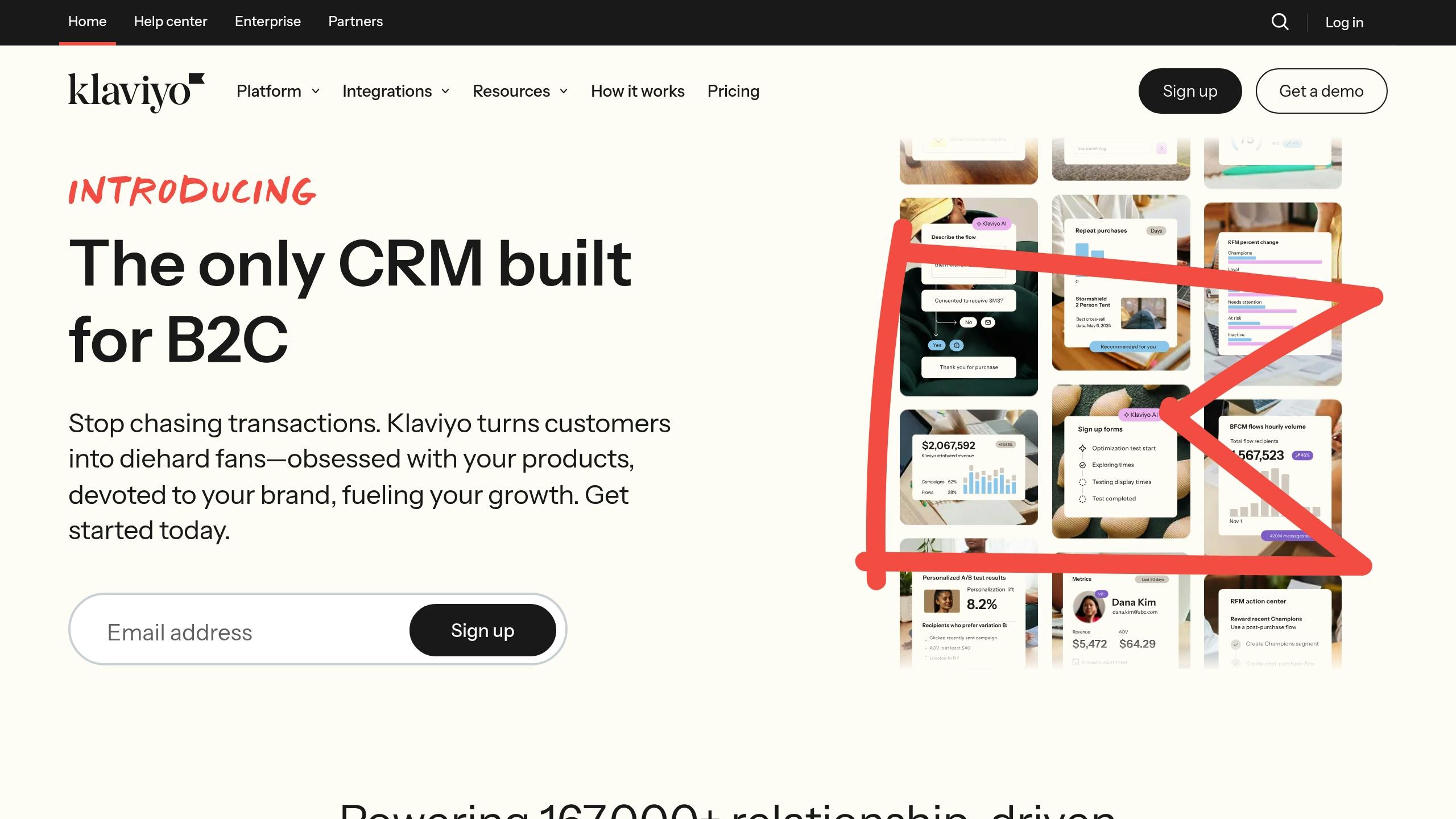
Klaviyo has become a go-to tool for businesses looking to boost revenue, with users seeing up to a 29% increase in revenue per recipient [1].
What sets Klaviyo apart is its ability to create highly specific audience segments. These segments allow businesses to craft campaigns tailored to individual customer behaviors and preferences. Key segmentation factors include:
- Shopping habits
- Interaction history with products
- Purchase frequency
- Predictions for customer lifetime value
Flexible Pricing for All Business Sizes
Klaviyo offers a pricing model designed to accommodate businesses at different stages of growth:
| Plan Level | Monthly Cost | Contact Limit | Key Features |
|---|---|---|---|
| Free | $0 | 500 | Basic email automation |
| $20 | 500 | Advanced segmentation | |
| Email & SMS | Custom | Unlimited | Omnichannel automation |
This flexibility means businesses can scale their marketing efforts without overextending their budgets.
Seamless Ecommerce Integration
Klaviyo integrates in real time with major ecommerce platforms, enabling features like:
- Abandoned cart recovery
- Post-purchase follow-ups
- Dynamic product recommendations
For companies looking to grow, Klaviyo’s predictive analytics tools are invaluable. These tools provide insights into customer lifetime value, the best times to launch campaigns, expected next purchases, and even the likelihood of customer churn.
Powerful Analytics and Global Reach
With over 100,000 businesses worldwide relying on Klaviyo, the platform’s analytics dashboard is a standout feature. It offers real-time reporting on campaign performance and revenue attribution, empowering marketers to make informed decisions that directly impact their bottom line [2].
Recent updates have further enhanced its email and SMS marketing capabilities, solidifying Klaviyo as a leader in customer engagement and revenue growth.
3. ActiveCampaign
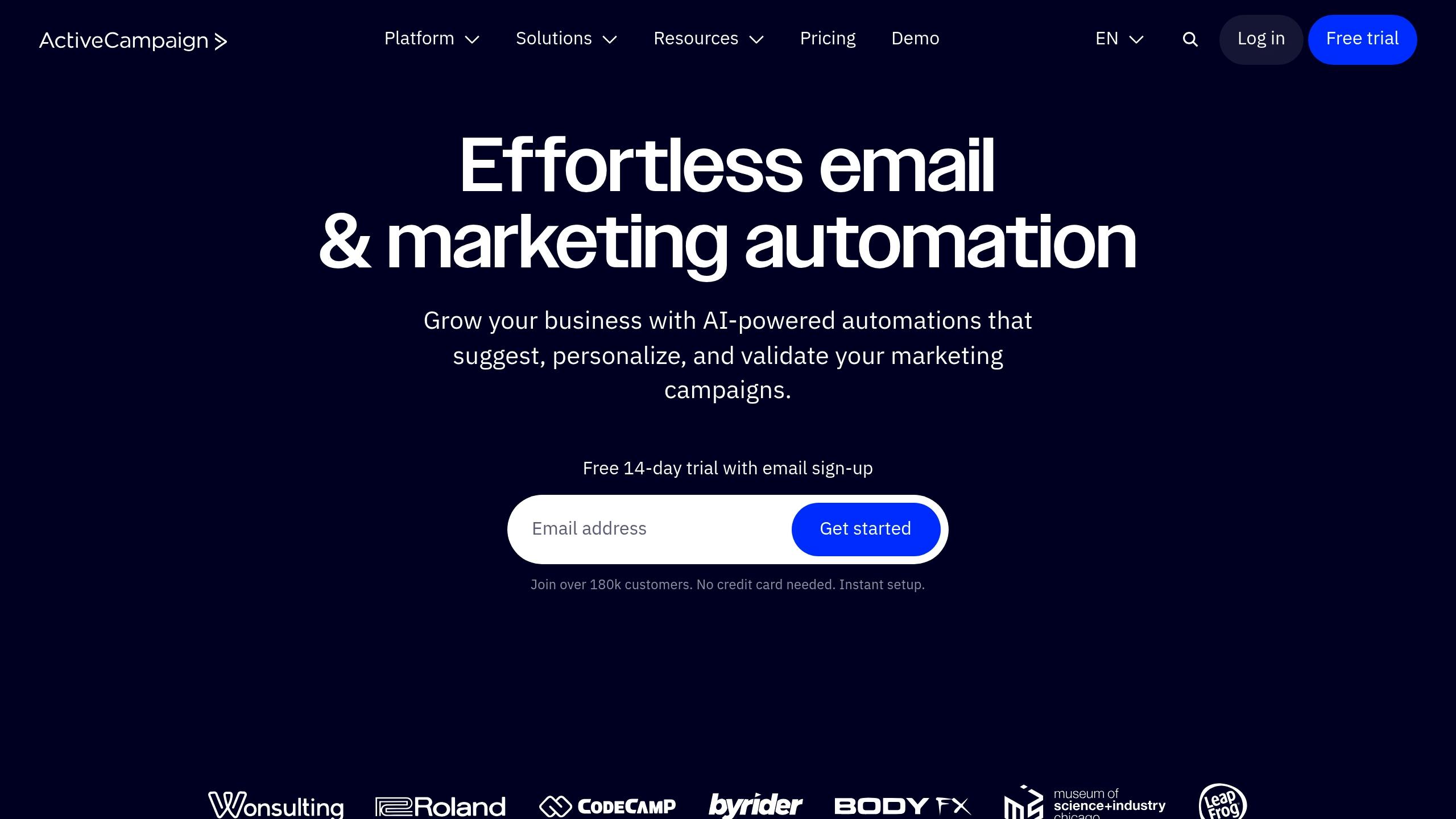
ActiveCampaign has grown into a full-fledged marketing automation platform, particularly known for its advanced email marketing tools and automation workflows. With over 300 native app integrations, it offers a flexible solution for streamlining marketing efforts [3].
Industry-Specific Solutions
One of ActiveCampaign's strengths is its ability to cater to various industries with tailored solutions:
| Business Type | Key Benefits | Primary Use Cases |
|---|---|---|
| E-commerce | Cart recovery, product suggestions | Post-purchase automation, customer retention |
| SaaS Companies | Behavior-based workflows | User onboarding, feature adoption |
| B2B Organizations | Lead scoring, CRM integration | Managing long sales cycles, nurturing leads |
| Marketing Agencies | Client management tools | Multi-account handling, reporting |
Advanced Automation Capabilities
A standout feature of ActiveCampaign is its AI-driven lead scoring system. This tool helps businesses pinpoint and prioritize their most promising prospects, which is especially useful for B2B companies dealing with longer sales cycles. These businesses often rely on consistent, targeted content to nurture leads over time [4].
"In 2025, ActiveCampaign is much more than the email marketing tool we started out as." – ActiveCampaign [5]
This level of automation is further enhanced by its ability to integrate seamlessly with other tools, ensuring all marketing efforts work together smoothly.
Integration Ecosystem
ActiveCampaign’s extensive integration options make it easier to unify marketing operations. Its native integrations ensure data flows seamlessly across your existing tech stack [6].
For businesses looking for advanced marketing automation without the headache of overly complex systems, ActiveCampaign strikes a balance. Its intuitive interface makes it accessible, while its powerful automation builder allows marketers to create detailed workflows. This makes it an excellent choice for growing businesses that need sophisticated tools without enterprise-level complications [7].
4. Salesforce Marketing Cloud Account Engagement (Pardot)
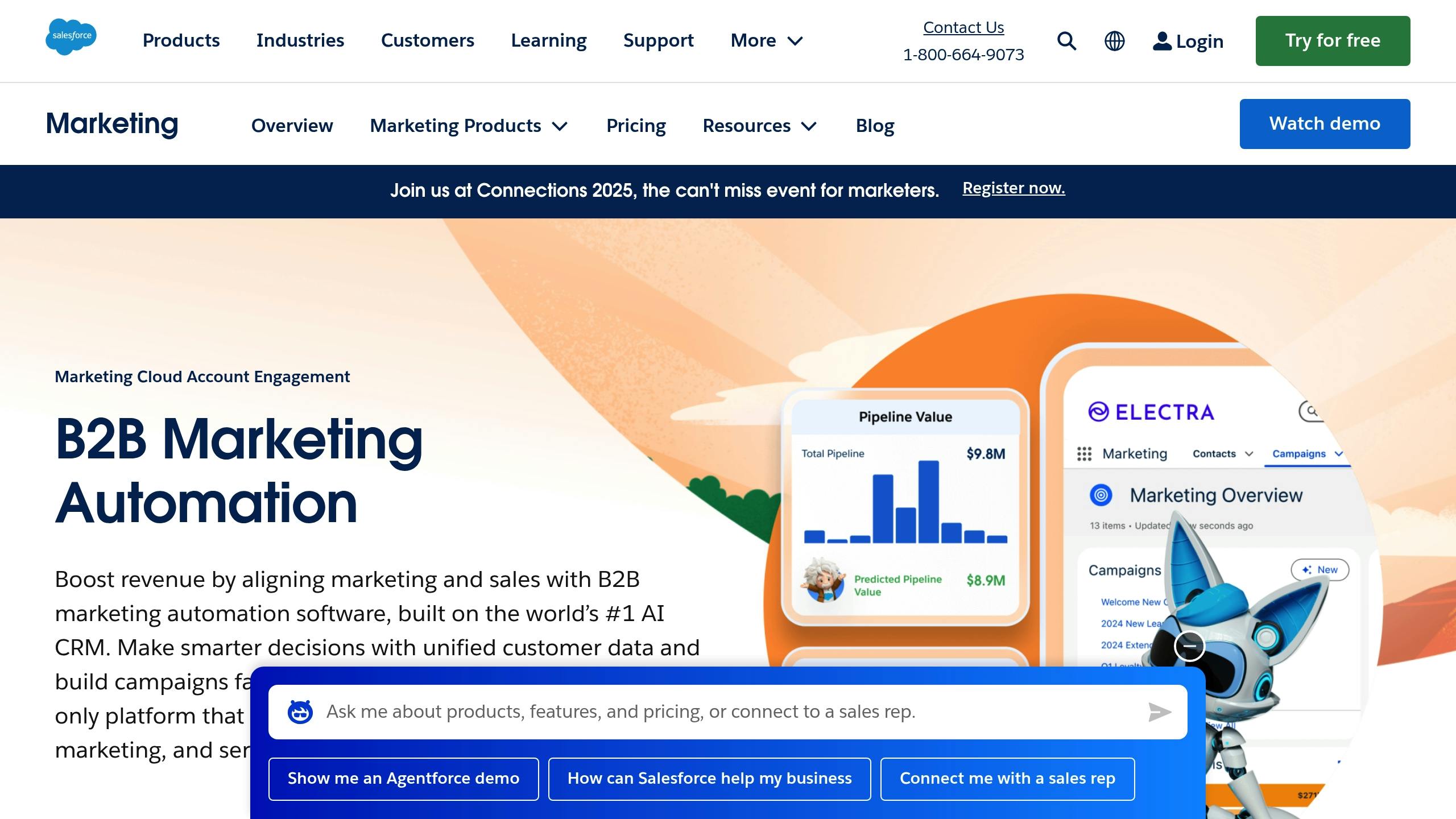
Salesforce Marketing Cloud Account Engagement, formerly known as Pardot, is a top-tier B2B marketing automation tool with seamless integration into Salesforce CRM. It's specifically designed to handle the complexities of extended sales cycles and detailed customer journeys.
Advanced Lead Management
This platform shines in lead evaluation, combining both quantitative and qualitative approaches to deliver actionable insights:
| Feature | Capability | Business Impact |
|---|---|---|
| Lead Scoring | Tracks prospect engagement | Pinpoints the most engaged prospects |
| Lead Grading | Evaluates fit with ideal customer profiles | Focuses efforts on high-quality leads |
| Einstein AI | Offers predictive scoring | Enhances conversion opportunities |
| Automated Assignment | Distributes leads using custom rules | Speeds up response times |
ROI-Driven Analytics
According to Salesforce data from 2024, businesses using this platform have seen a 34% boost in marketing productivity and a 37% increase in sales revenue – all thanks to more efficient lead management [8].
Enterprise Integration Ecosystem
One of its standout strengths is its native integration with Salesforce, ensuring real-time data sharing between marketing and sales teams. In addition, it connects with various essential business tools, such as:
- Content Management Systems: Platforms like WordPress and Drupal
- Webinar Tools: Zoom and GoToWebinar
- Social Media: Direct integration with major platforms
- Analytics: Google Analytics for performance tracking
- AppExchange: Access to a wide range of third-party apps
These integrations streamline collaboration and make it easier to track performance accurately.
Investment Considerations
The Growth edition starts at $1,250 per month (billed annually), with pricing tiers based on features and contact volume. This makes it a solid choice for mid-to-large B2B organizations across various industries. The platform is also compliant with GDPR and CCPA regulations, ensuring data security. Businesses should expect an implementation period of 3 to 6 months, depending on their specific needs and scale.
5. Brevo (Sendinblue)
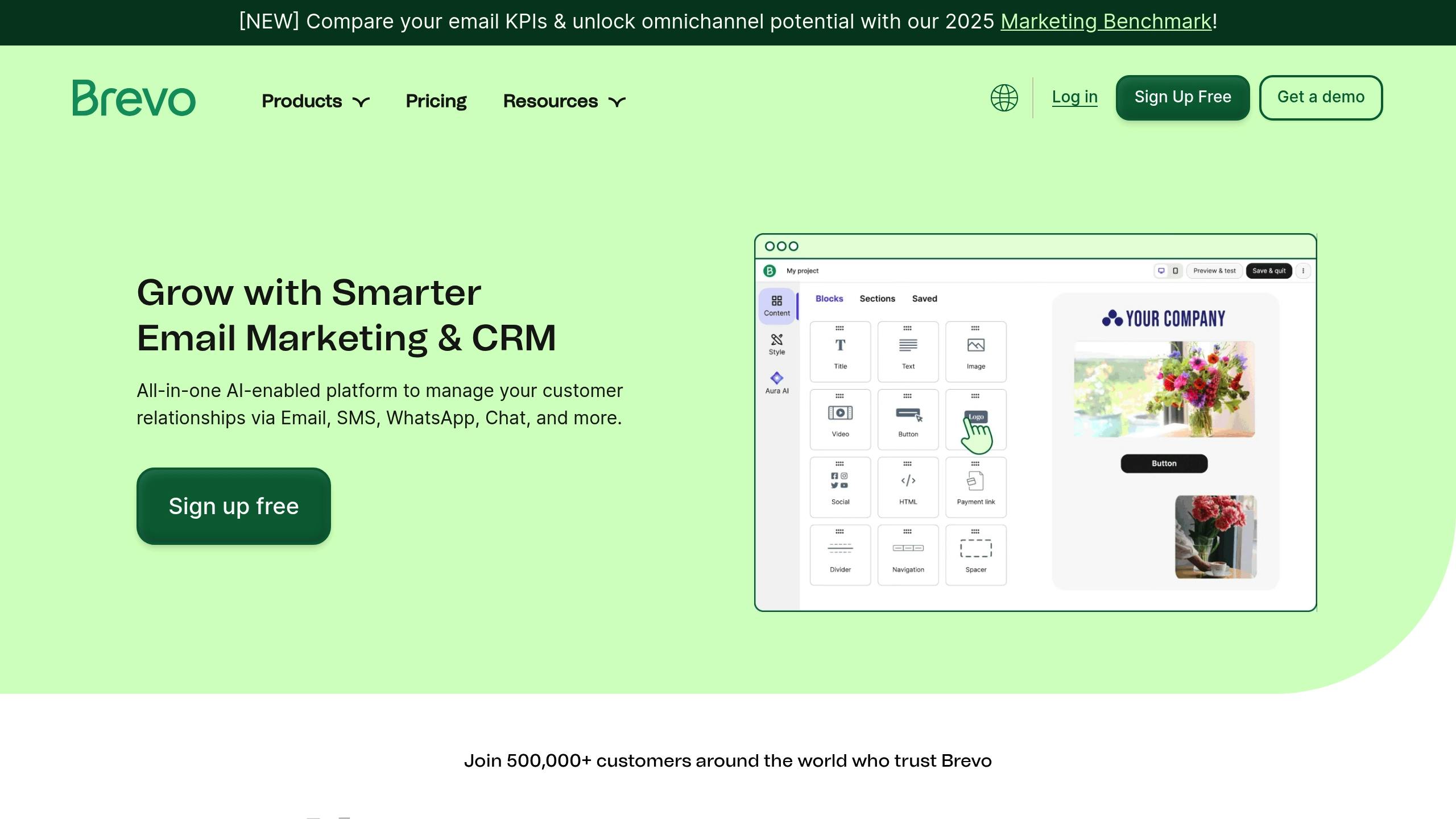
Brevo, previously known as Sendinblue, offers a well-rounded marketing automation platform designed to be both powerful and budget-friendly. Over time, it has grown into a full-service solution for businesses looking to simplify and enhance their marketing efforts.
Multi-Channel Automation Features
Brevo's automation builder allows businesses to create detailed marketing workflows that span multiple channels:
| Channel | Key Features | Benefit |
|---|---|---|
| Drag-and-drop editor; A/B testing | Boosts engagement | |
| SMS | Automated triggers | Enables direct, timely communication |
| Chat | Real-time interaction | Provides instant customer support |
| CRM | Advanced audience targeting | Helps drive conversions |
Smarter Segmentation and Personalization
Brevo excels at segmentation, allowing businesses to tailor campaigns based on customer behavior, purchase history, engagement levels, and even location. This level of targeting ensures that campaigns are relevant and effective, while the platform’s pricing adapts as your business grows.
Budget-Friendly Pricing
Unlike many competitors, Brevo charges based on email volume rather than the size of your contact list. Here’s a quick look at the available plans:
| Plan | Cost | Features |
|---|---|---|
| Free | $0 | Includes basic tools |
| Starter | $25/month | Offers core automation features |
| Business | Custom | Adds advanced automation options |
| Enterprise | Custom | Provides top-tier tools and support |
Practical Use in Business
One standout feature is its automated abandoned cart emails, which are particularly useful for e-commerce businesses. These emails help reengage shoppers by sending timely follow-ups, encouraging them to complete their purchases.
Seamless Integrations
Brevo connects effortlessly with essential tools like e-commerce platforms, CRM software, content management systems, and analytics tools. These integrations make it easier to sync your marketing efforts across different systems.
Commitment to Security and Compliance
Brevo adheres to strict data protection standards, including GDPR and CAN-SPAM compliance. It uses secure protocols to handle customer data and provides features like double opt-in for consent management, ensuring your business stays on the right side of privacy regulations.
Support Options
To assist users, Brevo offers a variety of support channels, including live chat, detailed documentation, video tutorials, webinars, and community forums. These resources make it easy for businesses to get the most out of the platform.
With its mix of features, affordability, and reliable support, Brevo is a solid choice for small to mid-sized businesses looking to streamline their marketing processes.
sbb-itb-d2ace5e
6. Marketo Engage
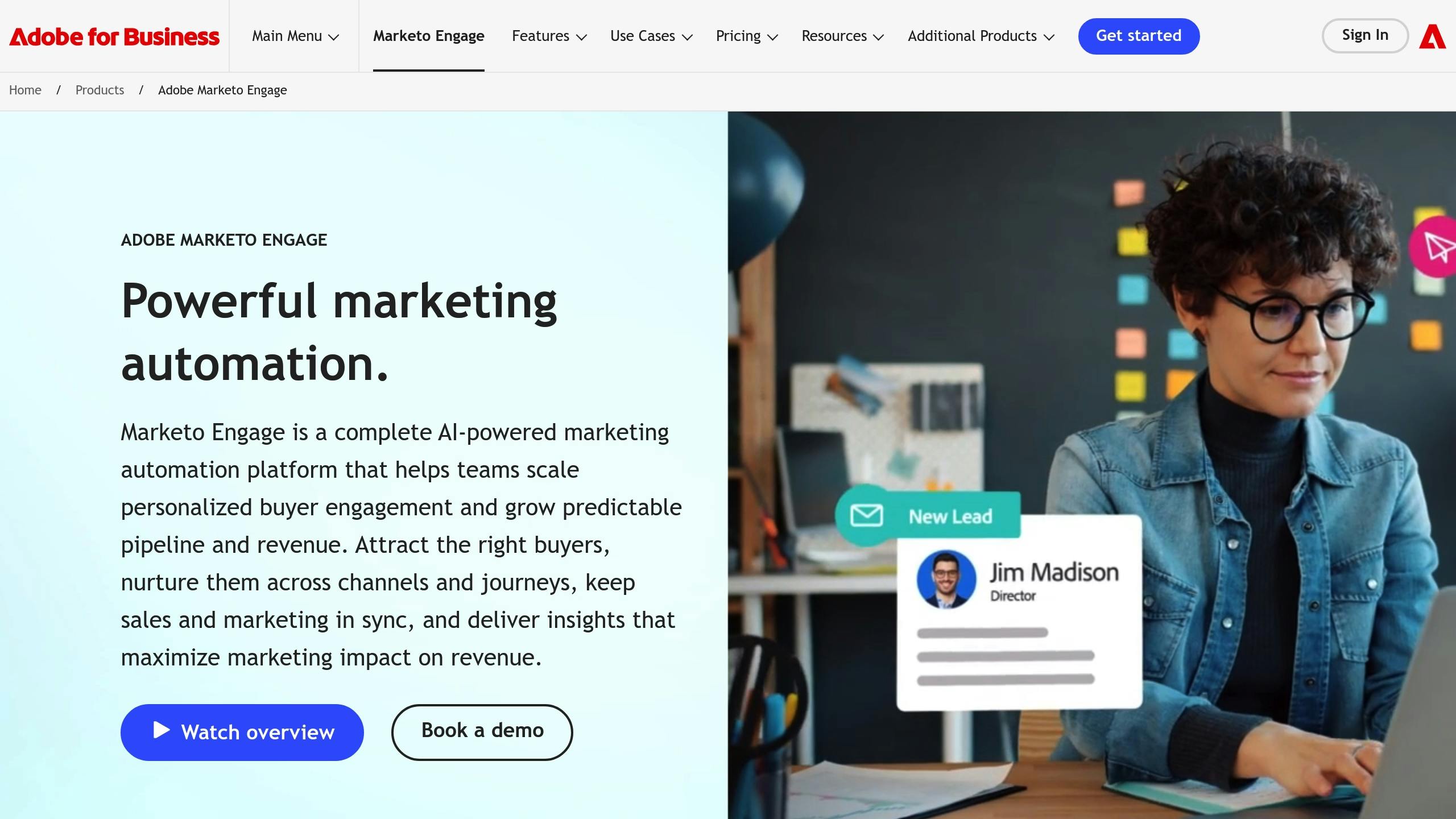
Part of the Adobe Experience Cloud, Marketo Engage stands out as a top-tier platform for enterprise-level marketing automation. It's particularly well-suited for managing sophisticated B2B marketing campaigns and handling advanced lead management.
Advanced Lead Management Capabilities
Marketo Engage offers a robust lead management system that combines tools for scoring and nurturing to pinpoint high-value prospects. Its Smart Lists feature allows for dynamic audience segmentation, automatically updating based on how prospects behave and engage with your campaigns.
Enterprise-Grade Features
| Feature Category | Core Capabilities | Business Impact |
|---|---|---|
| Lead Management | Automated scoring, behavioral tracking | Improves lead quality by 30% |
| Campaign Automation | Multi-channel coordination, A/B testing | Shortens sales cycle by 25% |
| Analytics | Revenue attribution, predictive insights | Boosts marketing ROI by 40% |
| Account-Based Marketing | Account profiling, cross-channel targeting | Elevates B2B engagement rates |
Real-World Success Story
"In 2022, Panasonic used Marketo Engage to unify their marketing efforts across 12 business units, resulting in a 23% increase in marketing-qualified leads and a 15% reduction in cost per acquisition. This transformation generated $4.2M in additional pipeline revenue within the first year."
- James Chen, Digital Marketing Director at Panasonic [9]
Pricing Structure
Marketo Engage provides flexible pricing tiers to suit businesses of varying sizes:
- Select Edition: Starts at $1,195/month (billed annually)
- Prime Edition: Starts at $1,995/month (billed annually)
- Ultimate Edition: Starts at $3,195/month (billed annually)
- Enterprise: Custom pricing tailored for large organizations
Integration Ecosystem
Marketo Engage integrates seamlessly with a variety of essential business tools, offering a particular advantage when paired with other Adobe Experience Cloud products. This integration ensures unified customer data management and enables coordinated campaigns across multiple channels.
AI-Powered Capabilities
The platform uses artificial intelligence for tasks like predictive lead scoring, personalized content recommendations, campaign optimization, and behavioral analytics.
Compliance and Security
Marketo Engage complies with major data protection laws, including GDPR and CCPA, safeguarding customer data across different regions.
With its extensive feature set, Marketo Engage processes more than 15 billion activities each month, demonstrating its scalability for enterprise needs. Next, we’ll dive into another tool that adds even more strength to marketing automation.
7. Omnisend
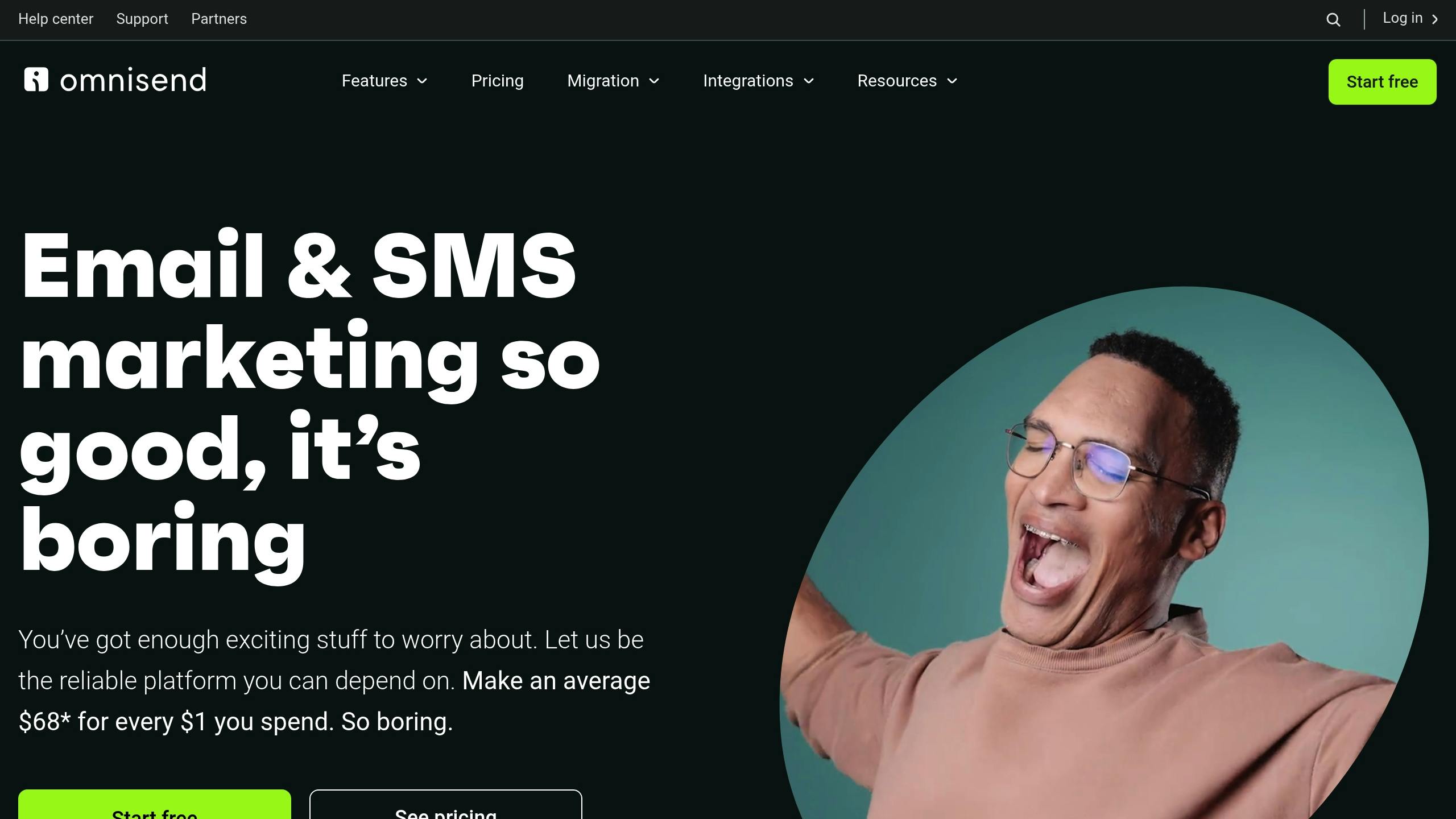
Omnisend is a comprehensive ecommerce automation platform that combines email and SMS to help businesses drive revenue. According to reports, automated workflows account for 30% of Omnisend’s total sales [10].
How Automation Drives Revenue
Omnisend’s pre-built workflows are designed specifically for ecommerce, delivering measurable results:
| Automation Type | Revenue Impact |
|---|---|
| Order Confirmation | Generates 17% of annual revenue [11] |
| Cart Recovery | Can add up to $65,000 in revenue per email [12] |
| Welcome Series | Delivers $68 for every $1 spent [13] |
These numbers highlight how Omnisend’s automation tools can quickly boost business performance.
Features for Advanced Ecommerce Marketing
Omnisend goes beyond email and SMS, integrating web push notifications to create a seamless, omnichannel experience for customers.
Success Stories from Real Businesses
Dan Judd, Head of Digital at Vape Superstore, shared his experience with Omnisend:
"What we were paying just for email at Klaviyo is nearly the same as what we're paying Omnisend for both email & SMS."
– Dan Judd [14]
Another example comes from The Golf Ball Nut. Digital Marketing Manager Stephen Bayless praised the platform:
"The features and support offered by Omnisend exceed market expectations."
– Stephen Bayless [15]
Tools Powered by Customer Data
Omnisend uses customer data to enhance marketing efforts with features like:
- Advanced audience segmentation
- Tailored, personalized messages
- Cross-channel analytics for unified insights
Seamless Integrations
Omnisend’s integrations expand its capabilities, offering tools like:
- Automated product recommendations
- Tracking of purchase behaviors
- Mapping out customer journeys
- Management of multiple store accounts
Hannah Ridler, Head of Marketing at Don’t Buy Her Flowers, highlighted why her team chose Omnisend:
"After comparing several platforms, we chose Omnisend for three reasons: The features, the pricing, and the relationship."
– Hannah Ridler [16]
With 75% of shoppers relying on reviews before making a purchase [17], Omnisend’s extensive features and glowing feedback from users make it a standout option. As ecommerce continues to grow, Omnisend remains at the forefront of marketing automation in 2025, helping businesses stay ahead with its evolving tools and strategies.
8. Customer.io
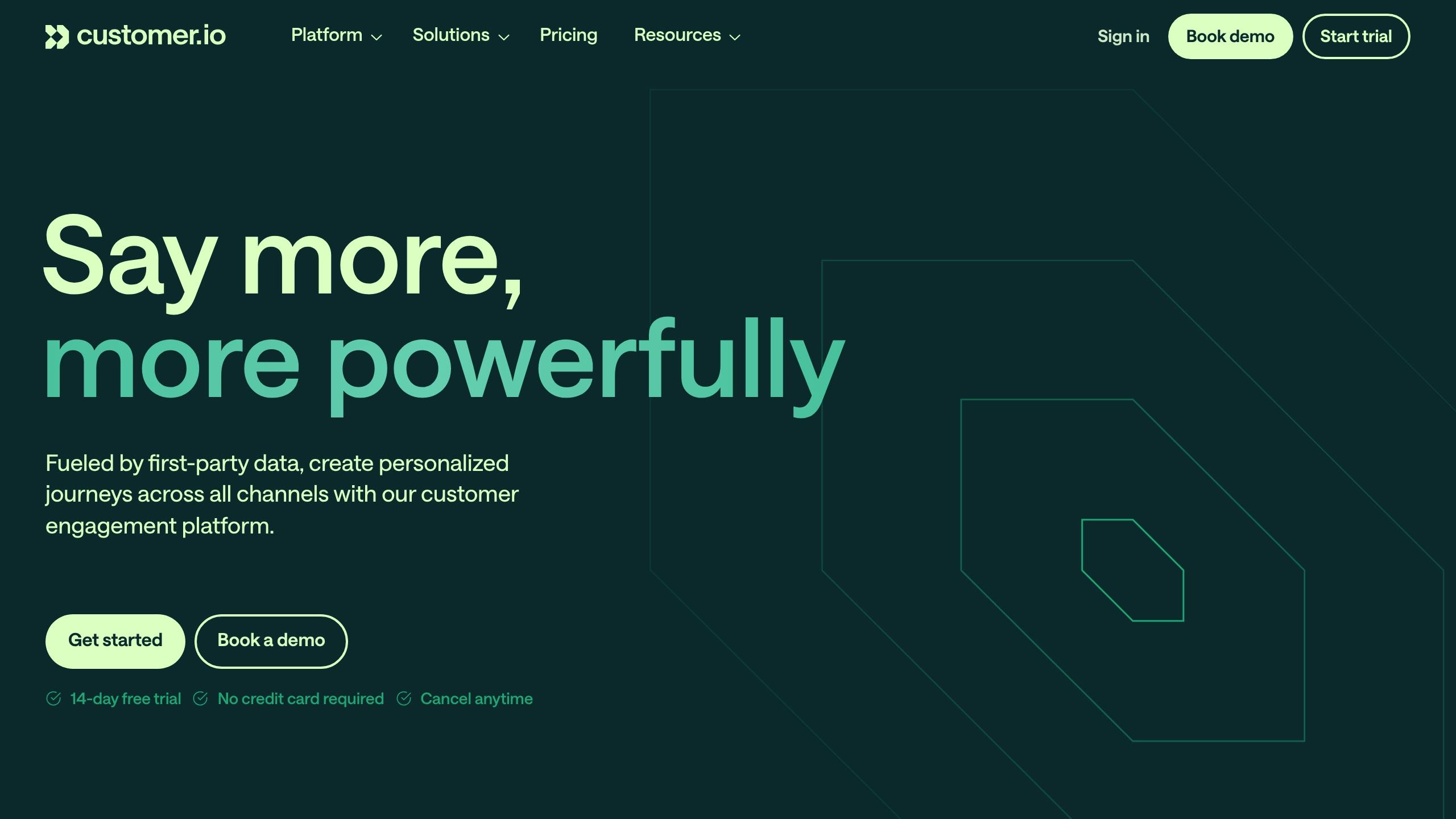
In 2025, Customer.io stands out as a leader in behavioral messaging, handling billions of events monthly to deliver timely and personalized customer interactions [18].
Advanced Behavioral Targeting
Customer.io’s visual workflow builder allows marketers to craft detailed customer journeys based on real-time user behavior. This is particularly useful for SaaS companies and businesses that operate primarily online.
| Feature | What It Offers |
|---|---|
| Multi-channel Messaging | Supports email, SMS, push notifications, and in-app messages |
| Real-Time Analytics | Provides instant insights into campaign performance |
| User Satisfaction | Earns a 4.4/5 rating from over 400 reviews |
| Setup Success Rate | 91% satisfaction for ease of setup |
These features form the foundation of its success, as demonstrated by real-world case studies.
Real-World Success Stories
Customer.io’s capabilities shine in real-world applications, helping businesses boost engagement and revenue. For example:
- Clearbit: By using Customer.io to design a complex onboarding sequence, Clearbit achieved a 32% increase in user activation rates within three months. They also reduced time-to-value by 27% by providing contextual guidance based on how users interacted with features.
- Buffer: Leveraging Customer.io’s segmentation tools, Buffer successfully re-engaged 15% of dormant users in just 60 days, leading to $420,000 in recovered annual recurring revenue.
Pricing Structure
Customer.io offers a straightforward, tiered pricing model:
- Basic: $150/month (supports up to 12,000 profiles)
- Premium: $995/month (includes access to advanced features)
- Enterprise: Custom pricing tailored to large-scale needs
This flexible pricing ensures businesses of all sizes can access the platform’s powerful tools.
Technical Capabilities
Customer.io is a developer-friendly platform, thanks to its powerful APIs and detailed documentation. It boasts a 94% user retention rate, reflecting its reliability and effectiveness. The platform also prioritizes data privacy, adhering to GDPR and CCPA standards. With precise segmentation and seamless integrations with tools like Segment, Zapier, and Salesforce, Customer.io enables advanced automation and efficient data management at scale.
Tool Features and Pricing
When choosing a marketing automation tool, it’s essential to weigh the core features and pricing structures of different platforms. This section breaks down key features and pricing models across eight popular tools to help streamline your decision-making process.
Feature Comparison
Here’s a quick look at how basic and premium platforms stack up in terms of features:
| Feature Category | Basic Platforms | Premium Solutions |
|---|---|---|
| Email Marketing | Standard templates, A/B testing, basic personalization | Advanced personalization and AI-driven optimization |
| Lead Management | Basic lead scoring and simple segmentation | Sophisticated lead scoring with detailed nurturing workflows |
| Analytics | Standard reporting with limited metrics | AI-powered insights, revenue tracking, and customizable dashboards |
| Integration | Limited third-party connections | Extensive integration options, including native CRM support |
| Support | Email support and basic documentation | 24/7 phone support with dedicated account managers |
Pricing Tiers
Pricing for marketing automation tools often depends on factors like contact list size, feature access, and support levels. Here's how the platforms compare:
| Platform | Entry-Level Pricing | Key Pricing Details |
|---|---|---|
| Platformly | Flexible pricing | Comprehensive all-in-one solution with powerful features |
| Klaviyo | Not specified | Scales with usage; popular among e-commerce businesses |
| ActiveCampaign | ~$15/month (Starter) | Tiered plans that expand with your contact list size |
| Salesforce Marketing Cloud Account Engagement (Pardot) | Custom pricing | Tailored enterprise-grade solutions |
| Brevo (Sendinblue) | Affordable | Budget-friendly option with essential automation tools |
| Marketo Engage | Custom pricing | High-end enterprise platform with advanced capabilities |
| Omnisend | Budget-friendly | Ideal for small businesses, especially in e-commerce |
| Customer.io | Mid-range | Flexible plans designed for SaaS and subscription-based models |
Note: Pricing may vary based on your business size, feature requirements, and specific needs.
Industry-Specific Solutions
Some platforms shine in specific industries:
- Klaviyo is a go-to for e-commerce brands, offering seamless integration with Shopify and advanced automation for features like abandoned cart recovery and personalized product recommendations.
- Salesforce Marketing Cloud Account Engagement and Marketo Engage cater to enterprise-level B2B businesses with complex sales cycles, providing robust lead management and multi-channel campaign capabilities.
- Brevo and Omnisend are excellent budget-friendly choices for businesses looking to simplify email and SMS automation.
- Customer.io specializes in behavioral messaging, making it a top pick for SaaS companies and subscription-based businesses.
Implementation and Scalability
Ease of use and scalability are critical when selecting a tool. Platforms like Platformly and Klaviyo are praised for their user-friendly interfaces, while enterprise-grade solutions such as Marketo Engage often come with a steeper learning curve but offer unmatched capabilities. Tools like Brevo and Omnisend feature drag-and-drop builders, making them easier to deploy for smaller teams [19].
Scalability is another key factor, especially for businesses planning for growth. Here’s how needs differ:
| Factor | Small Business Needs | Enterprise Requirements |
|---|---|---|
| Contact Limits | 1,000–10,000 contacts | Unlimited contacts |
| User Access | 1–5 team members | Multi-team access with role-based permissions |
| Automation Complexity | Basic workflows | Advanced, multi-channel campaigns |
| Data Management | Standard fields | Custom objects and advanced segmentation capabilities |
Support and Training Resources
Premium platforms like Platformly and Marketo Engage offer a wealth of support options, including 24/7 assistance, dedicated account managers, and extensive training libraries. These resources help teams overcome challenges and maximize the platform’s potential.
Additionally, integration capabilities play a vital role in enhancing usability. For example, Marketo Engage boasts "a vast marketplace, with dozens of integrations spanning social media, CRM, paid ads, and more to fully optimize your marketing efforts" [20]. With such extensive integration options, businesses can create a seamless tech stack that enhances efficiency and overall performance.
These insights provide a clearer picture of how to choose the right tool for your business goals.
Making Your Choice
Now that we've explored the features of each tool, let's focus on how to select the right one for your business. Marketing automation has proven to deliver impressive results – did you know email marketing generates an average of $36 for every $1 spent? [21]. Use the following criteria to zero in on the tool that fits your needs.
Assess Your Current Position
Start by evaluating your team's expertise and your marketing goals. The size of your business often dictates the type of platform you'll need. Here's a quick breakdown:
| Business Size | Recommended Features | Budget Range |
|---|---|---|
| Startup (1-10 employees) | Basic automation, email marketing, simple CRM | $15-100/month |
| SMB (11-100 employees) | Advanced segmentation, multi-channel campaigns | $800-1,500/month |
| Enterprise (100+ employees) | Custom objects, AI-powered analytics, advanced integrations | $2,000+/month |
Smaller businesses often benefit from user-friendly platforms, while larger enterprises require tools that can handle more complex workflows.
Focus on Data Management
Accurate and well-organized data is the foundation of any successful marketing automation strategy. Companies that prioritize clean data report a 66% boost in revenue [22].
"Clean, grouped data is the backbone of good marketing automation. Without it, even the best software can't do much." – Peter Buijs, CEO-Founder of Go Online Now [23]
Beyond simply maintaining clean data, leveraging advanced technology can take your marketing efforts even further.
Consider AI Capabilities
AI is reshaping the marketing landscape, with 71.1% of marketers believing it can outperform humans in certain tasks [24]. Look for platforms that offer:
- Personalization and campaign optimization
- Customer journey mapping
- Predictive analytics and content recommendations
These features can help you deliver highly targeted and effective campaigns.
Integration Requirements
Seamlessly integrating your marketing automation platform with your CRM is crucial. This connection enhances the capabilities of both systems, allowing you to elevate customer engagement and streamline operations.
Security and Compliance
Protecting customer data is non-negotiable. Opt for tools with strong data protection features and compliance measures to ensure you're meeting regulatory standards while safeguarding sensitive information.
ROI Potential
Finally, focus on platforms that deliver measurable ROI. Businesses that implement effective lead nurturing strategies see purchase values increase by 47% [25]. Many marketing automation tools also demonstrate significant improvements in lead generation and conversion rates [26]. Choosing the right platform can make a substantial difference to your bottom line.
FAQs
How can I pick the best marketing automation tool for my business and industry?
How to Choose the Right Marketing Automation Tool
Selecting the best marketing automation tool boils down to understanding your business size, goals, and specific industry needs. If you're running a small business, focus on cost-effective, easy-to-use tools that cover the basics, like email campaigns and lead tracking. These features are usually enough to streamline your marketing efforts without overwhelming your budget or team.
For larger organizations, the requirements are often more complex. You might need robust platforms that handle multi-channel campaigns, offer detailed analytics, and have the capacity to grow with your business. Scalability becomes a key factor here, ensuring the tool can adapt as your operations expand.
Another critical consideration is integration. The tool should work smoothly with your current systems and meet any specialized requirements, like compliance with industry regulations. By matching the tool's features to your business goals, you'll set yourself up for greater efficiency and a better return on investment (ROI).
What are the main advantages of using AI in marketing automation tools?
Integrating AI into marketing automation tools can transform how businesses connect with their audience. By analyzing user behavior and preferences, AI enables highly tailored customer interactions, which often result in stronger engagement and improved conversion rates.
It also simplifies time-consuming tasks like data analysis, customer segmentation, and predictive modeling. This means marketers can spend less time on technical processes and more on creative and strategic initiatives. On top of that, AI delivers real-time insights, helping teams fine-tune campaigns, make smarter decisions, and get the most out of their marketing budgets. These features position AI as a critical element in today’s marketing playbook.
What steps can businesses take to ensure data security and compliance when using marketing automation tools?
To protect sensitive customer information and ensure compliance when using marketing automation tools, businesses should focus on a few key practices: data encryption, strict access controls, and routine security audits. These steps are essential for minimizing the risk of unauthorized access or potential breaches.
Adhering to regulations like the General Data Protection Regulation (GDPR) and the California Consumer Privacy Act (CCPA) is equally important. This includes maintaining transparent data practices and securing proper user consent. Additionally, providing employees with regular training on data privacy and security can further bolster compliance efforts while fostering customer trust.


